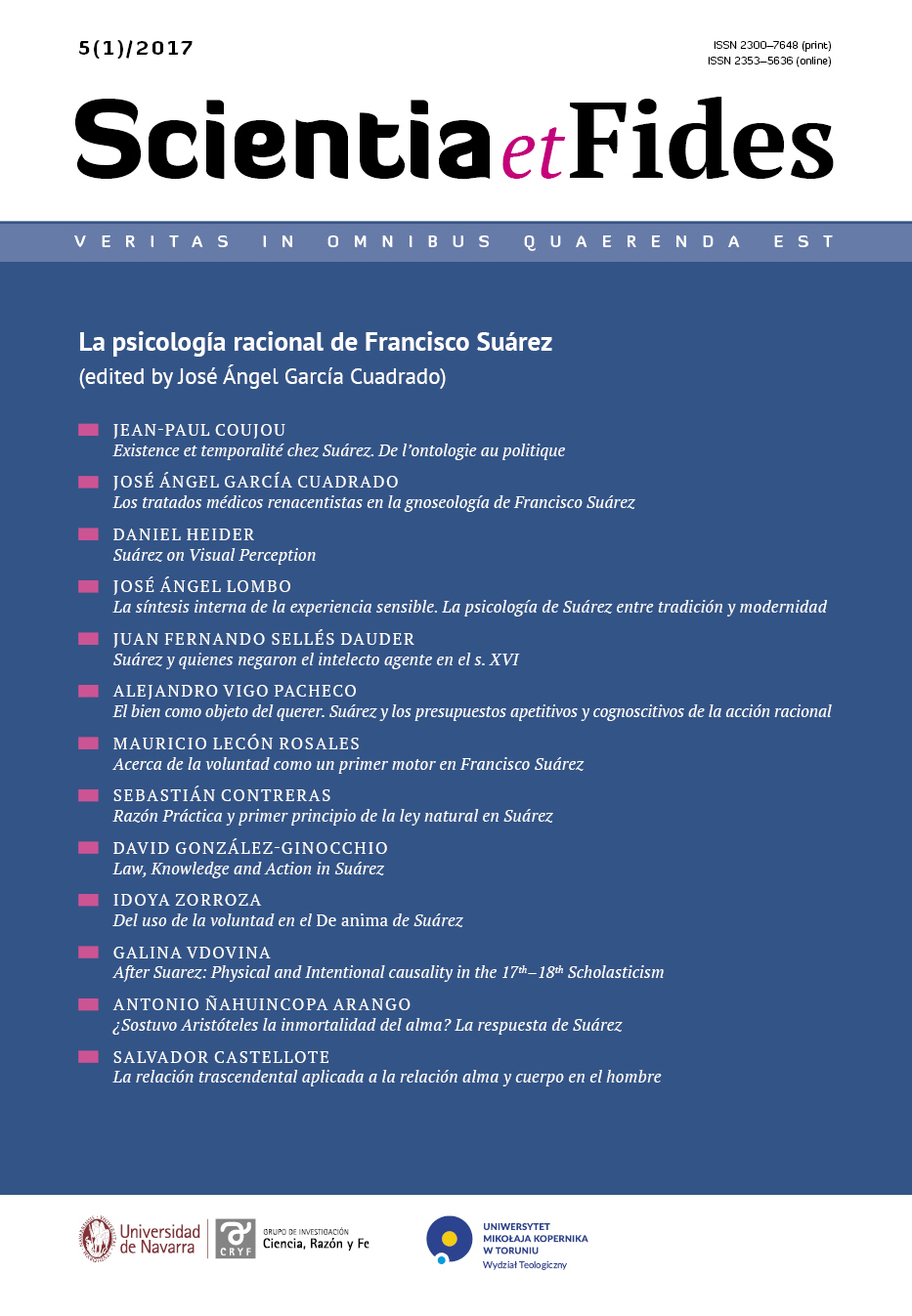El bien como objeto del querer. Suárez y los presupuestos apetitivos y cognoscitivos de la acción racional
Keywords
action, desire, will, practical intellect, ratio boni, ratio finisAbstract
The good as the object of wanting. Suárez on the appetitive and cognitive conditions of rational action
This paper discusses Suárez’s characterization of the formal object of wanting, i.e. the good. Wanting, in all its possible forms, is based on cognition, in its various possible forms. But the starting point for wanting something is given in a judgement about its goodness. What is wanted, in its turn, provides the starting point for deliberation. The ratio boni marks the first transtion (i.e. the transtition from cognition to wanting), the ratio finis the second one (i.e. the transition from wanting to deliberation).
References
Aristóteles. 2012. Metafísica, edited by V. García Yebra. Madrid: Gredos.
Aristóteles. 1985. Ética Eudemia, edited by E. Lledó. Madrid: Gredos.
Aristóteles. 2008. De anima. Sobre el alma, edited by T. Calvo. Madrid: Gredos.
Aristóteles. 2000. De motu animalium. Movimiento de los animales, edited by A. Miguel. Madrid: Gredos.
Coujou, J. P. 2012. Droit, an¬thro¬pologie et politique chez Suarez. Perpignan: Éditions Artège.
Darge, R. 2004. Suárezʼ transzendentale Seinsauslegung und die Metaphysiktradition. Leiden–Boston: Brill.
Moss, J. 2012. Aristotle on the Apparent Good. Perception, Phantasia, Thought, and Desire. Oxford : Oxford University Press.
Riedenauer, M. 2000. Orexis und Eupraxia. Ethikbegründung im Streben bei Aristoteles. Würzburg: Königshausen & Neumann.
Suárez, F. 1961. Disputaciones Metafísicas, edited by S. Rábade. Madrid: Gredos.
Suárez, F. 1991. Commentaria una cum quaestionibus in libros Aristotelis De Anima. Tomo 3, edición crítica por S. Castellote. Madrid: Fundación Xavier Zubiri.
Vigo, A. G. 2007. “Medios y fi¬¬nes en el Gorgias de Platón (466a-468e).” Méthexis (Sankt Augustin) 20: 181-201.
Vigo, A. G. 2008. “Prâxis como modo de ser del hom¬bre. La concepción aristotélica de la ac¬ción racional.” En: Filosofía de la Acción. Un aná¬li¬¬sis his¬tó¬ri¬co-sistemático de la acción y la racionalidad práctica en los clásicos de la fi¬lo¬sofía, edited by G. Leyva, 53-86. Madrid: Síntesis.
Vigo, A. G. 2010. “La concepción aristotélica del silo¬gis¬mo práctico. En de¬fen¬sa de una inter¬pre¬tación restrictiva.” Diánoia (México): 65: 3-39.
Vigo, A. G. 2011a. “Intelecto, deseo y razón según Francisco Suárez.” En Ra¬zón práctica y derecho. Cuestiones filosófico-jurídicas en el Siglo de Oro es¬pañol, edited by J. Cruz Cruz, 11-29. Pamplona: Eunsa.
Vigo, A. G. 2011b. “Incontinencia, carácter y razón según Aristóteles.” En Estudios Aristotélicos, 325-362. Pamplona: Eunsa.
Vigo, A. G. 2016. “Intellekt, Wunsch und Handlung. Handlungsproduktion und Hand-lungs¬recht¬¬¬¬fer¬tigung bei Francisco Suárez.” En The Concept of Law (lex) in Moral and Poli¬ti¬cal Thought of the “School of Salamanca”, edited by K. Bunge, M. J. Fuchs, D. Sim¬mer¬ma¬cher, A. Spindler, 229-248. Leiden: Brill.
Vigo, A. G. 2016. “Suárez y la estructura de la verdad práctica” (inédito).
Downloads
Published
How to Cite
Issue
Section
License
CC BY ND 4.0. The Creator/Contributor is the Licensor, who grants the Licensee a non-exclusive license to use the Work on the fields indicated in the License Agreement.
- The Licensor grants the Licensee a non-exclusive license to use the Work/related rights item specified in § 1 within the following fields: a) recording of Work/related rights item; b) reproduction (multiplication) of Work/related rights item in print and digital technology (e-book, audiobook); c) placing the copies of the multiplied Work/related rights item on the market; d) entering the Work/related rights item to computer memory; e) distribution of the work in electronic version in the open access form on the basis of Creative Commons license (CC BY-ND 3.0) via the digital platform of the Nicolaus Copernicus University Press and file repository of the Nicolaus Copernicus University.
- Usage of the recorded Work by the Licensee within the above fields is not restricted by time, numbers or territory.
- The Licensor grants the license for the Work/related rights item to the Licensee free of charge and for an unspecified period of time.
FULL TEXT License Agreement
Stats
Number of views and downloads: 723
Number of citations: 1



